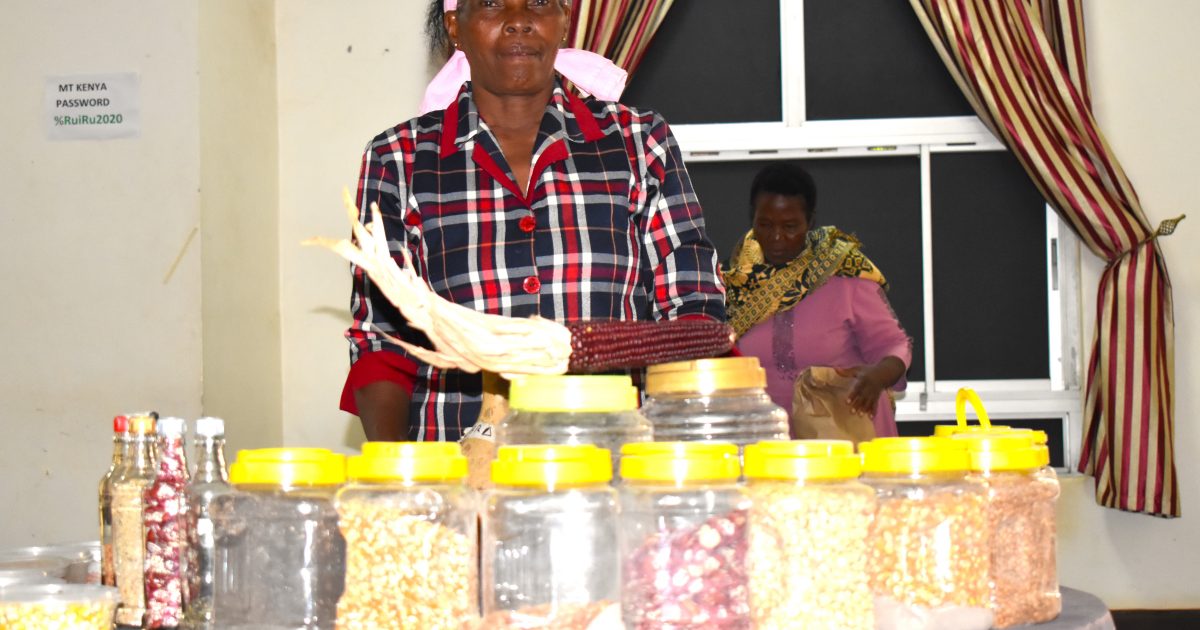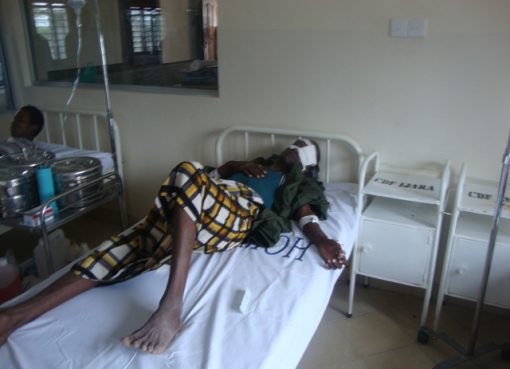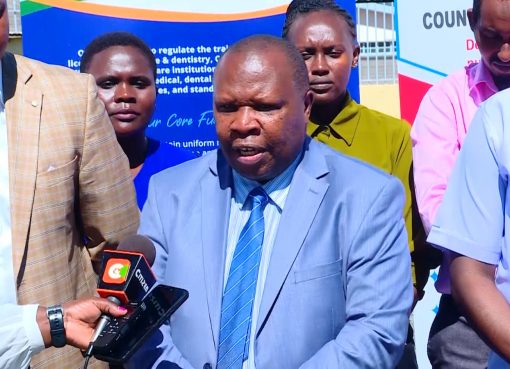Biodiversity and Biosafety Association of Kenya (BIBA Kenya) is calling on farmers to preserve indigenous seeds in order to reclaim and protect food safety, health and biodiversity.
BIBA Kenya National Coordinator Anne Maina has observed that lack of quality seeds has posed challenge in access of adequate quantities of nutritious foods.
She noted that indigenous seed varieties need to be preserved to provide households with diversified sources of nutritious food, hence boosting food security in the country.
Maina made the remarks during a forum that brought together farmers, Civil Society Organizations and the media on sensitization about seed systems, policy and legal framework and the ongoing review initiatives in Kenya.
“Farmers are custodians of indigenous knowledge and they have established that the solutions to the challenges facing the global food system lay in proper farmer managed seed systems,” said Maina during the forum held at a Ruiru hotel Friday.
She observed that indigenous seeds and traditional African crops have high nutritional value and are resilient to climate change, adding that the seeds mature faster and are drought-resistant.
“Indigenous seeds are those that have been grown, selected and managed by local communities through several generations and are naturally adapted through an influence of local environmental factors in their growing environments,” added Maina.
Statistics from the Kenya Plant Health Inspectorate Service (KEPHIS) indicate that the informal (indigenous) seed sector in Kenya accounts for between 60-70 percent of seeds planted by farmers across the country.
Seed systems in Kenya are broadly categorized into two types: formal and informal. A formal seed system is characterized by a well-regulated and organized set of activities, from breeding to delivering certified seeds of known and registered varieties to farmers.
Informal (indigenous) seed systems involve individual small scale farmers or groups of farmers or community based producing seed for their own use.
In Kenya, indigenous food crops like sorghums, millet, cassava, leafy vegetables, yams, arrowroots, beans, cowpeas among others have shown significant nutritional superiority, over the corresponding hybrid seed varieties indicating that their preservation and dissemination will help in promoting healthy and sustainable agroecosystems.
The coordinator noted that continued overreliance on a few select hybrids seeds, monoculture and use of toxic pesticides pose a big threat to food biodiversity, threatening traditional food cultures and livelihoods of people.
“Over the years, informal seeds have been under threat as they have been undermined by the radical introduction of hybrid varieties. The conservation and use of traditional crop varieties should be recognized as a critical way of climate change adaptation,” she explained.
Maina averred that one of challenges arising from use of formal and hybrid seed varieties is increased lifestyle diseases like cancer, which have become more common in the country.
She said going back to organic farming and use of indigenous seeds in farming is part of the solution and stakeholders in the food system value chain have a role in supporting farmers to preserve the country’s indigenous seed system.
“Farmers are our seed savers and some of them are running seed learning centers where they are reviving local seed varieties that were previously lost and promoting them,” she added.
The coordinator explained that climate change had changed the landscape as previously wet areas had dried up and were experiencing drought, hence the need to promote the indigenous resilient crops for sustaining food security was critical.
“Some of these indigenous crops are drought tolerant. They are able to withstand a lot of new pests such as the fall armyworm,” she opined, adding that they are able to mitigate the effects of climate change because they can be grown sustainably without the use of pesticides.
At the same time, Maina called for a review of the Seeds and Plant Varieties Act to allow farmers share indigenous seeds saying that the Act as it is now, discourages the use of indigenous seeds.
She said the prohibitive laws should be relaxed and that Kenya needs to establish regulations that would allow farmers to exchange and sell seeds among themselves, which would further enhance the conservation of indigenous seeds.
“Community seed exchange promotes a culture of collaboration and diversity in our seed system. The more we share seeds, the more we grow, the more our seed system grows, the more the community grows,” she said.
Maina urges the government to come up with regulations that will secure the seed sovereignty of Kenya’s indigenous seeds in a bid to promote food security and biodiversity.
“The government needs to fast track the repeal of related laws to allow such groupings to also sell seeds to boost their earnings to improve their economic status” she said.
On his part, Fred Odhiambo, an organic farmer from Rongo, Migori County said that besides farming, he is a seed saver who perseveres indigenous seeds like bloody butcher maize, turmeric, dasheen arrowroot (nduma), sweet potato among others.
According to Odhiambo, the nutritional value of bloody butcher maize is 25 percent higher than the normal white maize in the market. It is a drought resistant variety that performs admirably in harsh conditions.
“Bloody butcher corn is a distinctive corn with red / red-black kernels. Used for corn flour, corn meals or as corn on the cob when young,” said Odhiambo, adding that it is ready to harvest in 80 days.
He said the sweet potato plant is a rich source of vitamin K, while turmeric is an anti-inflammatory plant used for medicinal purposes.
“The purple leaves from the sweet potato plant are cooked and are a source of vitamin K that helps in blood clotting” he said.
Gladys Kanengeni, a farmer from Kirinyaga who has been practicing organic farming for the past five years said she has seen the benefits in her household.
“Quality seeds means that the seeds are free from pests and diseases. This means the cost of farm inputs is lowered, hence profitable farming” she said, adding that she conserves seeds varieties like managu, green grams, rosemary, climbing beans and bloody butcher maize.
Kanengeni also promotes farmers in her area to conserve indigenous seed, through training them on proper ways to preserve them.
Beatrice Mwangi, also an organic farmer in Gilgil , conserves indigenous seeds every season, which allows farmers to produce safer and healthier foods using readily available indigenous seeds.
“Once identified, the seeds are preserved in a seed bank, where farmers can access them during planting season,” said Mwangi, adding that the seed varieties range from maize, beans and traditional vegetables.
She said traditional vegetables like sagaa and managu are rich in proteins, vitamins, carbohydrates and minerals which are lacking in most leafy vegetables.
According to the Kenya Climate Smart Agriculture Strategy (2017–2026), negative climate change impacts are expected to be more adverse in developing countries, particularly those in sub-Saharan Africa such as Kenya.
Climate change is posing a serious threat to livelihoods, and if not mitigated, many nations risk facing serious food shortages.
Countries are encouraged to adapt to climate change, build resilience of agricultural systems, while minimizing emissions for enhanced food and nutritional security and improved livelihoods.
Seed systems are the backbone of sector research, quality assurance, extension and distribution. They are the trigger point to create more productive small-scale and commercial farmers able to shift to more sustainable farming practices.
BIBA Kenya is a network of farmer groups, Community Based Organizations, Non-Governmental Organizations and Faith based organizations that is promoting seed sovereignty through Farm Managed Seed Systems (FMSS) for biodiversity, biosafety, food and seed security.
By Anita Omwenga





